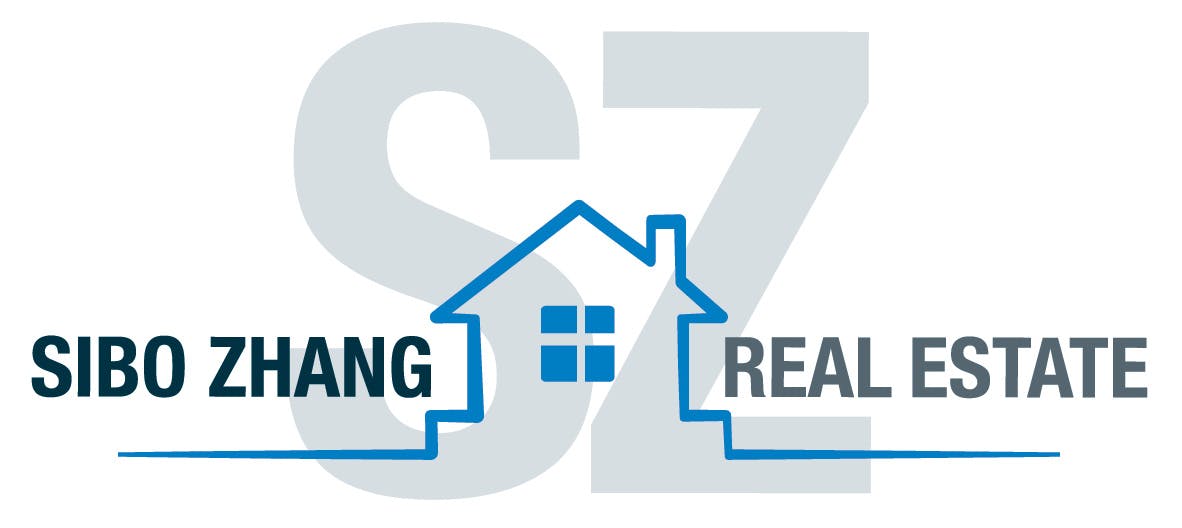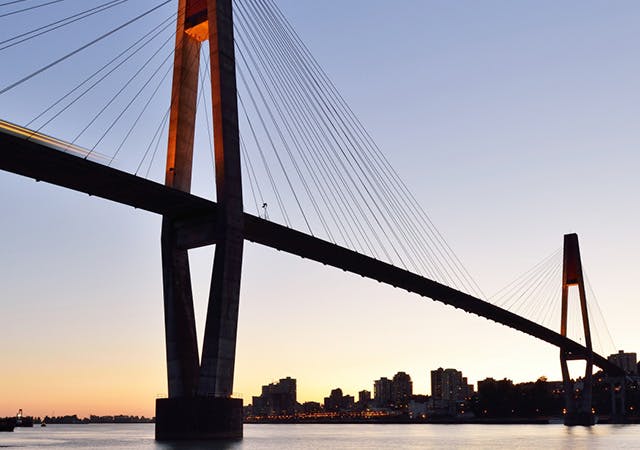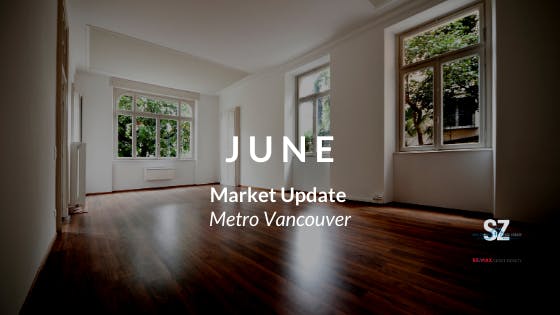With all markets seriously impacted, some devastated during this period, the durability of residential real estate values in Metro Vancouver speaks volumes.
Continue reading →metro vancouver real estate

Covid-19 conditions still dampen activity, prices stable; condos show price reductions
As to be expected, home sales across Metro Vancouver showed a steep decline in April due to Covid-19. However, that is not to say that the market is dormant. In fact, considering the impact on normal home shopping activity at this time of year, prices across all property types show a remarkable robustness. The one-month overall decline of 56 per cent in residential ales since March still correlated with a 0.2 per cent increase in the composite benchmark price for the same period. At the end of April the benchmark price rose to $1,035,000. On a one-year comparison, this is 2.5 per cent higher than April 2019 and is line with the steadily increasing prices in an otherwise stable market since October 2019. One persistent decrease, however, is the number of new listings in Metro Vancouver. As reported in this newsletter at the end of last year, there has been a steady decline in the rate of new listings for several years. It is difficult to analyse the factors for the decline in new listings in the current conditions. The basic reason may well be that sellers expect prices to rise significantly from their current level in the foreseeable future. There is still an ample supply to provide a good choice with over 9,300 homes currently listed. But it’s worth watching the supply side. With nearly a 60 per cent decrease in new listings compared with one year ago, and a 50 per cent decrease month-over-month decrease in April 2020, a diminishing supply could be a factor if prices begin to rise more rapidly. However, I would remind anyone who is thinking about selling now that prices have been relatively stable for many months, so by listing now you can get readily noticed. I can advise you from direct market experience how to set an optimal for you home. Please give me call if you want chat.
I am also encouraging anyone who is home shopping to take advantage of the many new online tools to facilitate your search, your financing, and even the purchase process. Online innovations can assist you greatly. Please take a look at the resources included for you on my website at: www.liveincentralcity.ca
If you would like to remain active in your home searching while remaining at home, this one-stop-shop has everything you will need. Here you can easily conduct a search for any property type across Metro Vancouver, with updates loaded every 15 minutes. You will be able to locate the available listed property, its listed price. its street address, and find its location quickly on the interactive map along with a clear picture of the property. You can also create your own custom market comparison and quickly see what sales activity has recently occurred in the neighborhood with data on price changes and comparable properties recently sold. Below I have listed my monthly comparison of benchmark prices for each property type in selected areas of the greater Vancouver region. By comparing benchmark prices provided by the Greater Vancouver Real Estate Board, you can get a good idea of what comparable homes cost in different areas. The selection I have made for you is based on geographical areas immediately above and below the benchmark price to give you a good idea of where prices may most closely match your budget. You will also be able see the most up to date change in prices, whether an increase or decrease since last month’s newsletter. This month I draw your attention to condominium prices, which have decreased in every example.
Detached Homes
The benchmark price for a single-family detached home in Greater Vancouver at the end of May was $1,462,100, an increase of 0.8 per cent from the preceding month. The extremities of this average were Vancouver West (not West Vancouver) at $2,975,400 and Maple Ridge at $844,500. The three municipalities closest to the benchmark on the higher side of the average were: at $1,453,100 an increase of 1.2 per cent from the preceding month; Burnaby South at $1,502,400, an increase of 0.6 per cent from the preceding month; and Richmond at $1,530,500, an increase of 0.5 per cent from the preceding month. The three municipalities closest to the benchmark on the lower side of the average were: Port Moody at $1,443,600 an increase of 1.8 per cent from the preceding month; Vancouver East at $1,430,100, an increase of 0.3 per cent from the preceding month; and Burnaby East at $1,220,400, a decrease of 0.4 per cent from the preceding month.
Townhouses
The benchmark price for a townhouse in Greater Vancouver at the end of April was $796,800, an increase of 0.6 per cent from the preceding month. The extremities of this average were Vancouver West (not West Vancouver) at $1,131,800 and Maple Ridge at $544,800. The three municipalities (excluding Whistler which is too far out more most of my clients) closest to the benchmark on the higher side of the average were: Richmond at $802,300 an increase of 0.9 per cent from the preceding month; Vancouver East at $909,300, a increase of 1.8 per cent from the preceding month; and North Vancouver at $986,100 an increase of 2.0 per cent from the preceding month. The three municipalities closest to the benchmark on the lower side of the average were: Burnaby South at $780,000, an increase of 1.5 per cent from the preceding month; New Westminster at $759,700, an increase of 1.4 per cent from the preceding month; and Burnaby North at $727,100, a decrease of 0.1 per cent from the preceding month.
Condominiums
The benchmark price for a condominium in Greater Vancouver at the end of March was $685,500, a decrease of 0.2 per cent from the preceding month. The extremities of this average were West Vancouver at $995,200 and Maple Ridge at $360,900. The three municipalities closest to the benchmark on the higher side of the average were: Burnaby East at $750,400, a decrease of 2.4 per cent from the preceding month; Vancouver West (not West Vancouver) at $805,900 a decrease of 0.6 per cent from the preceding month; and West Vancouver at $995,200, an decrease of 3.2 per cent from the preceding month. The three municipalities closest to the benchmark on the lower side of the average were: Burnaby South at $673,700, a decrease of 0.2 per cent from the preceding month; Port Moody at $670,900, a decrease of 0.1 per cent from the preceding month; and Richmond at $652,600, a decrease of 0.4 per cent from the preceding month.
Let me help
By working hard for my clients, I stay abreast of the most recent events in the real estate market. This includes monitoring monthly price fluctuations for every property type. If you would like to chat about your needs, whether for selling or buying, I am happy to talk to you. I never pressure anyone, but I can give you honest and informed advice so you can make your best decisions. Please feel free to call: 1 (604) 779-7992
Thanks for reading!
Sibo Zhang, REALTOR®

Despite Covid-19, housing prices and new listings move upwards

What a difference a month can make! As every sector of our economy is trying to cope with COVID-19 disruptions, there are many sources of pressure on the housing market. At the beginning of March, we were beginning to see a resurgence in demand for residential properties in Greater Vancouver. A stifled market after a lengthy period of onerous mortgage rules that had reduced demand had come to end. Buyers who had been waiting to see how low prices would go were now rapidly making offers in an optimal period of low interest and eased mortgage lending requirements. In the first two weeks of March, before the full COVID-19 effect was felt, residential sales across Metro Vancouver jumped over 17 per cent from the preceding month, reaching over 46 per cent higher than one year earlier. Then, just as quickly, a decline set in for the last half of the month – undoubtedly attributable to the precautions necessitated by the epidemic. At present, this unprecedented situation can only be monitored for its impact on the real estate market in the short term. While sophisticated statistical models can provide us with best- and worst-case scenarios, the spread of the virus is ultimately dependent on the behavior of people. However, there is optimism across our region that we are making progress in slowing the rate of infections through social distancing and other safety measures. Of course, this has impacted the ability of home seekers to attend open houses but there is still much you can do online and by phone. For this reason, I want to provide you with information that is useful during this challenging time.
If we are to consider the effect of the coronavirus on our housing market, we must focus on the timing of events. With the surge in demand in early March, we can see some larger than usual price increases beginning to take place. There was also a close to an 11 per cent increase in new listings in Metro Vancouver in March compared with February. This may be interpreted as a shift from a lengthy period of being a “buyers’ market” now transitioning to a “sellers’ market.” What this means is that the underlying demand of housing is pushing upwards and encouraging more people to put their property up for sale as prices rise. I have been advising home buyers to move quickly for the past couple of months, and I still encourage you to keep this market shift in mind. While Covid-19 may slow a rapid increasedue to the practical problems of visiting properties, it will not eliminate the underlying demand which has been pent up for a couple of years. Even with the slowing effect in the last half of March, the composite benchmark price for all residential properties in Metro Vancouver at the beginning of March was $1,033,700, a 1.3 per cent increase from February. Broken down to each property type, there month-over-month increase across the board: 1.2 per cent increase for detached homes; 0.9 per cent increase for townhouses; and 1.4 per cent increase for condominiums. In the comparative benchmarks below, you can see that prices in the past month far exceed the number of decreases.
Detached Homes
The benchmark price for a single-family detached home in Greater Vancouver at the end of March was $1,450,700, an increase of 1.2 per cent from the preceding month. The extremities of this average were Vancouver West (not West Vancouver) at $2,942,200 and Maple Ridge at $835,100. The three municipalities closest to the benchmark on the higher side of the average were: Burnaby North at $1,453,100 an increase of 2.4 per cent from the preceding month; Burnaby South at $1,493,500, an increase of 1.1 per cent from the preceding month; and Richmond at $1,522,800, an increase of 0.9 per cent from the preceding month. The three municipalities closest to the benchmark on the lower side of the average were: Vancouver East at $1,426,500, an increase of 1.3 per cent from the preceding month; Port Moody at $1,420,300, an increase of 0.6 per cent from the preceding month; and Vancouver East at $1,225,300, an increase of 2.5 per cent from the preceding month.
Townhouses
The benchmark price for a townhouse in Greater Vancouver at the end of March was $791,800 an increase of 0.9 per cent from the preceding month. The extremities of this average were Vancouver West (not West Vancouver) at $1,133,500 and Maple Ridge at $535,100. The three municipalities closest to the benchmark on the higher side of the average were: Richmond at $795,000 an increase of 1.4 per cent from the preceding month; Vancouver East at $893,300, a decrease of 1.2 per cent from the preceding month; and Vancouver West (not West Vancouver) at $1,133,500, an increase of 0.2 per cent from the preceding month. The three municipalities closest to the benchmark on the lower side of the average were: Burnaby South at $768,400, a decrease of 0.6 per cent from the preceding month; New Westminster at $749,000, an increase of 0.7 per cent from the preceding month; and Burnaby North at $727,700, no change from the preceding month.
Condominiums
The benchmark price for a condominium in Greater Vancouver at the end of March was $687,000, an increase of 1.4 per cent from the preceding month. The extremities of this average were West Vancouver at $1,027,600 and Maple Ridge at $359,700. The three municipalities closest to the benchmark on the higher side of the average were: Burnaby East at $678,900, an increase of 4.8 per cent from the preceding month; Vancouver West (not West Vancouver) at $810,800, an increase of 1.9 per cent from the preceding month; and West Vancouver at $1,027,600, an increase of 1.4 per cent from the preceding month. The three municipalities closest to the benchmark on the lower side of the average were: Burnaby South at $674,900, a decrease of 0.5 per cent from the preceding month; Port Moody at $671,900, an increase of 3.8 per cent from the preceding month; and Richmond at $655,200, an increase of 2.3 per cent from the preceding month.
Let me help
I am working hard to help my clients during this challenging time. I know many of you want to find a home while prices are still within your budget; if you need help navigating the new rules for eased mortgage stress testing; or if you are looking for the best mortgage for your financial capacity, please give me call. There is a lot we can do online and by telephone. I encourage you to visit my website for an extensive list of properties, prices, and areas. Together we can meet the challenges we are facing with COVID-19 and still manage your housing needs.
Please don’t hesitate to give me a call. (604) 779-7992
Thanks for reading!
Sibo Zhang, REALTOR®
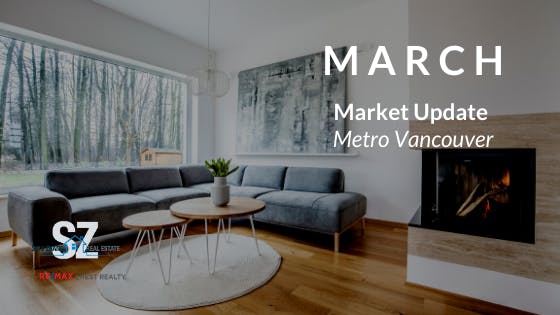
Spring home sales pick up pace; eased stress rules, lower interest rates
Spring has arrived and already there’s a noticeable increase in home shoppers actively engaged in visiting open houses across Metro Vancouver.
Continue reading →
One particular constant in Metro Vancouver’s residential market
There’s a single constant in the Greater Vancouver housing market that everyone should keep in mind. It can be expressed as simply as this: people want to live here. This includes families, singles, young people starting out in life, mid-career people with children, and retired seniors. Our region continues to grow in population size; not, however, in geographical size. It is to be expected, therefore, that residential housing will continue to rise in price over the long term. I think most people understand this, and those who see their lives as average and middle class are happy with a regulatory system that keeps prices to a moderate and somewhat predictable rate of increase. That is what we have been experiencing for several months now. What is a bit worrisome is that the supply side is not keeping pace, and if it continues to slow, as I have reporting here for the past few months, there is the looming fear that prices could we suddenly rise more rapidly than they are at present. The supply of housing can only increase with more listings from current owners, or from more residential building, which by necessity must be either with densification or with more towers. Let’s look at what the market statistics tell us now.
The composite benchmark price for all residential properties in Metro Vancouver at the end of January 2020 was $1,008,700. This was 0.8 per cent higher than the preceding month, and 1.4 per cent higher that six months ago. The average monthly increase has been relatively small but steady. It is possible that some homeowners may be using this rate to gauge when they will list their home for sale. And of course, if there is surge in prices, this may also trigger more listings, but the actual psychology of homeowners cannot be determined by this alone. It would be reasonable to guess that new listings may come from a market segment where age is an important determinant of selling one’s home. In the meantime, we must contend with currently low new listings, Last month’s new listings were over 17 per cent below the 10-year average. The total number of homes listed for sale in Metro Vancouver at the end of January was 8,617. This was a 20.3 per cent decrease compared with the same month one year ago. From these figures you can see that decreasing supply is occurring in the Metro Vancouver market place. In actual numbers, however, there is still an ample supply and at very good prices at present. Sales of detached homes and townhouses both increased by 0.5 per cent in the past month; and condominium sales increased 1.0 per cent in the same period. It’s an excellent time to make an offer on home. Check out the property types and areas below for comparative benchmark changes in the past month.
Detached Homes The benchmark price for a single-family detached home in Greater Vancouver at the end of January 2020 was $1,431,200, an increase of 0.8 per cent from the preceding month. The extremities of this average were Vancouver West (not West Vancouver) at $2,929,600 and Sunshine Coast at $564,900. (Note I include the Sunshine Coast only as a factor in the average, but do not report on housing prices in this area because it is too far away for my clients). The three municipalities closest to the benchmark on the higher side of the average were: Burnaby South at $1,493,500, an decrease of 0.1 per cent from the preceding month; Richmond at $1,503,100, a decrease of 0.5 per cent from the preceding month; and North Vancouver at $1,536,800, an increase of 1.6 per cent from the preceding month. The three municipalities closest to the benchmark on the lower side of the average were: Burnaby North at $1,407,700, an increase of 1.3 per cent from the preceding month; and Port Moody at $1,399,800, no change from the preceding month.
Townhouses The benchmark price for a townhouse in Greater Vancouver at the end of January 2020 was $782,500, an increase of 0.5 per cent from the preceding month. The extremities of this average were Vancouver West (not West Vancouver) at $1,147,200 and Maple Ridge at $522,300. The three municipalities closest to the benchmark on the higher side of the average were: Vancouver East at $903,600, an increase of 2.6 per cent from the preceding month; North Vancouver at $478,400, an increase of 0.2 per cent from the preceding month; and Vancouver West (not West Vancouver) at $1,147,200, an increase of 1.0 per cent from the preceding month. The three municipalities closest to the benchmark on the lower side of the average were: Richmond, at $775,500, an increase of 0.7 per cent from the preceding month; Burnaby South at $768,100, an increase of 0.7 per cent from the preceding month; and New Westminster at $732,900, an increase of 1.2 per cent from the preceding month.
Condominiums The benchmark price for a condominium in Greater Vancouver at the end of January 2020 was $663,200, an increase of 1.0 per cent from the preceding month. The extremities of this average were West Vancouver at $996,600 and Maple Ridge at $342,400. The three municipalities closest to the benchmark on the higher side of the average were: Burnaby East at $714,500, a decrease of 0.1 per cent from the preceding month; Vancouver West at $775,700, an increase of 2.0 per cent from the preceding month; and West Vancouver at $996,600 a decrease of 1.3 per cent from the preceding month. The three municipalities closest to the benchmark on the lower side of the average were: Burnaby South at $661,700, an increase of 1.5 per cent from the preceding month; Port Moody at $640,700, a decrease of 2.2 per cent from the preceding month; and Richmond at $634,100, an increase of 0.6 per cent from the preceding month.
How can I help? I’m always eager to help my clients in any way I can. Please don’t forget I also bring strong banking and finance experience to help with your budget and mortgage planning. And if you are thinking about renovations on your existing home, I can offer good advice on what your investment will return to your future home value. I can also recommend reputable and reliable tradespeople who provide quality work at reasonable rates. Please let me know if I can assist in any way at all. It’s a pleasure for me to help you.
Please don’t hesitate to give me a call. (604) 779-7992
Thanks for reading!
Sibo Zhang, REALTOR®
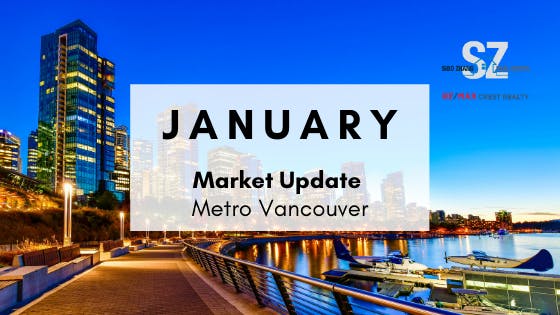
New year sees prices moving upwards: combined residential benchmark rises over $1-million
Metro Vancouver
With both a new year and a new decade underway, many people will want to take notice of a significant event that has occurred in the Greater Vancouver real estate market. At the beginning of January, the combined benchmark price for a residential property rose above the 1-million mark. At $1,001,900, it is nearly $12,000 higher than at the end of September 2019. This is a substantial increase in the last quarter of 2019, yet it is worthwhile noting that it is still almost $18,000 less than in mid-2017, when it first surpassed the $1-million mark before government measures took effect in 2018. In short, I think we can now confidently expect continued upward prices, although at a more gradual rate than the pre-2017 upward price spiral. At the same, we are closing the gap relatively quickly to where prices were three years ago. If you have been delaying a decision to make a purchase offer, there is good reason to make it now. Another quarter at the same rate of increase will add another $10,000 to the benchmark price, and this may not be the only factor. Home listings can play a significant role.
It is important to watch the supply of homes on the market. Generally, there has been a decline in new listings over the past three years. While home hunters have no worries of finding lots of available homes to choose from, the decline in total inventory may start having an upward push on prices if demand continues to rise. At the end of 2019, the total of residential listings across all property types in Greater Vancouver reached close to 52,000. However, this was more than a 3.0 per cent decrease from 2018, and a 5.0 per cent decrease from 2017. Currently, inventory levels still offer an excellent variety to choose from in each of the residential categories. At the end of December 2019, the number of homes listed for sale in Metro Vancouver was over 8,600. Please take a look below at the comparative prices in each of the property type across Greater Vancouver that I have selected for you. This will allow to see the price changes over one month for areas closest to the benchmark price. If you have questions about any particular property type or municipal area, please don’t hesitate to give me a call.
Detached Homes
The benchmark price for a single-family detached home in Greater Vancouver at the end of December 2019 was $1,423,500, an increase of 0.6 per cent from the preceding month. The extremities of this average were Vancouver West (not West Vancouver) at $2,920,800 and Sunshine Coast at $574,600. (Note I include the Sunshine Coast only as a factor in the average, but do not report on housing prices in this area because it is too far away for my clients). The three municipalities closest to the benchmark on the higher side of the average were: Burnaby South at $1,494,500, an increase of 0.6 per cent from the preceding month; Richmond at $1,495,400, a decrease of 0.3 per cent from the preceding month; and North Vancouver at $1,513,300, an increase of 1.1 per cent from the preceding month. The three municipalities closest to the benchmark on the lower side of the average were: Port Moody at $1,399,800, an increase of 0.3 per cent from the preceding month; Vancouver East at $1,390,100, an increase of 0.9 per cent from the preceding month; and Burnaby North at $1,389,000, an increase of 0.6 per cent from the preceding month.
Townhouses
The benchmark price for a townhouse in Greater Vancouver at the end of December 2019 was $778,400, an increase of 0.7 per cent from the preceding month. The extremities of this average were Vancouver West (not West Vancouver) at $1,135,800 and Maple Ridge at $533,800. The three municipalities closest to the benchmark on the higher side of the average were: Vancouver East at $880,800, an increase of 2.3 per cent from the preceding month; North Vancouver at $928,500, a decrease of 0.9 per cent from the preceding month; and Vancouver West (not West Vancouver) at $1,135,800, an increase of 0.2 per cent from the preceding month. The three municipalities closest to the benchmark on the lower side of the average were: Richmond, at $770,300, an increase of 0.5 per cent from the preceding month; Burnaby South at $762,600, a decrease of 0.9 per cent from the preceding month; and Burnaby North at $724,200, a decrease of 0.6 per cent from the preceding month.
Condominiums
The benchmark price for a condominium in Greater Vancouver at the end of December 2019 was $656,700, an increase of 0.9 per cent from the preceding month. The extremities of this average were West Vancouver at $1,009,900 and Maple Ridge at $347,500. The three municipalities closest to the benchmark on the higher side of the average were: Burnaby East at $715,000, a decrease of 0.4 per cent from the preceding month; Vancouver West at $760,300, an increase of 1.3 per cent from the preceding month; and West Vancouver at $1.009.900, a decrease of 1.3 per cent from the preceding month. The three municipalities closest to the benchmark on the lower side of the average were: Burnaby South at $652,000, an increase of 0.7 per cent from the preceding month; Richmond at $630,200, an increase of 0.5 per cent from the preceding month; and Port Moody at $626,800, a decrease of 0.5 per cent from the preceding month.
Best Wishes for a happy and prosperous New Year!
This is a time when many new year’s resolutions are about doing something around your home, or perhaps even doing something with your home. If you are planning to renovate, build a deck, or decorate your home’s interior, I can help you find reputable and reliable tradespeople. If you are planning a home purchase, I can provide financial expertise on your mortgage planning. I truly enjoy being able to help my clients in any way I can.
Please don’t hesitate to give me a call. (604) 779-7992
Thanks for reading!
Sibo Zhang, REALTOR®

Stable market conditions across all property types as summer draws to an end
METRO VANCOUVER
Where’s the market at now? That’s a question I’ve been hearing lately. It tells me people are aware of the dramatic price drop on homes for over a year. Whether someone has been waiting to list or buy, they seem to have sense that it’s now time to act – and I have to agree! I’ve been tracking the monthly price changes for you here in a period of market cooling since the all-time high in 2017. Of course, prospective buyers were reluctant to make an offer while the price trend has been downward. They are always wondering if the bottom has arrived, and will prices start moving up again?
It’s easy to fall into this kind of attitude, but it’s important to remember that there are multiple factors that make up price movements. To be practical, we can narrow our considerations to the assumptions that the downward trend we’ve seen in the past 15 months was due to stricter mortgage rules, with additional taxes also playing a role. However, the real estate market is made up of buyers and sellers who want to – indeed, need to – have transactions. And in a mature market area like Metro Vancouver, we can reasonably expect to return to what we call typical market activity.
Our two past summer months reflect what I would call this kind of typical activity, and even with some monthly decline in both sales and listings last month, I would venture to say that over the past two summer months, activity across Metro Vancouver appears to have returned to normal.
The combined benchmark price for a residential property in Greater Vancouver at the end of August was $990,300, a decrease of 0.2 per cent from July. This is too small a decrease to suggest an ongoing downward trend, and it should be noted that this benchmark is still below the $1-million mark which surpassed by the majority of single-family detached homes in Metro Vancouver’s various areas. Looking at the total inventory of homes on the market at the end of August, we have a plentiful supply at 13,396, which is over 13 per cent higher than one year ago. While the total sales in August were down 5.9 per cent compared with July, this cannot itself be construed as ongoing downward movement. It’s important to note that the number of August sales was actually close to 16 per cent higher than they were for the same month a year ago.
In short, if you want to make a sale or a purchase, there’s no time like the present. Take a look at the price comparisons I have selected for you below.
Detached Homes
The benchmark price for a single-family detached home in Greater Vancouver at the end of August was $$1,406,700, a decrease of 0.7 per cent from the preceding month. The extremities of this average were Vancouver West (not West Vancouver) at $2,880,800 and Sunshine Coast at $584,600. (Note I include the Sunshine Coast only as a factor in the average, but do not report on housing prices in this area because it is too far away for my clients.) The three municipalities closest to the benchmark on the higher side of the average were: Port Moody at $1,420,900, a decrease of 1.5 per cent form the preceding month; Richmond at $1,458,800, a decrease of 1.5 per cent from the preceding month; and Burnaby South at $1,467,900, a decrease of 0.6 per cent from the preceding month. The three municipalities closest to the benchmark on lower side of the average were: Burnaby North at $1,375,500, an increase of 0.2 per cent from the preceding month; Vancouver East at $1,346,500, a decrease of 0.5 per cent from the preceding month; and Burnaby East at $1,165,800, a decrease of 1.4 per cent from the preceding month.
Townhouses
The benchmark price for a townhouse in Greater Vancouver at the end of August was $771,900, an increase of 0.2 per cent from the preceding month. The extremities of this average were Vancouver West (not West Vancouver) at $1,115,100 and Maple Ridge at $522,800. The three municipalities closest to the benchmark on the higher side of the average were: Richmond at $774,900, an increase of 0.5 per cent from the preceding month; Vancouver East at $838,100, a decrease of 1.1 per cent from the preceding month; and North Vancouver at $960, 200, an increase of 1.7 per cent from the preceding month. The three municipalities closest to the benchmark on the lower side of the average were: Burnaby South at $767,000, an increase of 0.8 per cent from the preceding month; Burnaby North at $721,500, a decrease of 0.2 per cent from the preceding month; and New Westminster at $713,000, a decrease of 0.1 per cent from the preceding month.
Condominiums
The benchmark price for a condominium in Greater Vancouver at the end of August was $654,000, an increase of 0.1 per cent from the preceding month. The extremities of the average were West Vancouver at $1,062,100 and Maple Ridge at $351,500. The three municipalities closest to the benchmark on the higher side of the average were: Burnaby East at $700,700, a decrease of 2.9 per cent from the preceding month; Vancouver West at $756,000, an increase of 0.5 per cent from the preceding month; and West Vancouver at $1,062,100, a decrease of 2.2 per cent from the preceding month. The three municipalities closest to the benchmark on the lower side of the average were: Burnaby South at $648,500, a decrease of 0.8 per cent from the preceding month; Richmond at $626,700, an increase of 0.7 per cent from the preceding month; and Port Moody at $622,200, a decrease of 1.0 per cent from the preceding month.
Other ways I can help
I am here to help you, whatever your housing requirements, I bring experience in banking and finance to assist you in your mortgage planning. If you are thinking about listing your home for sale, I can also advise you on the optimal price for the current market conditions. And in case you are thinking about home renovations that will increase your home value, I can provide a comparative analysis on properties in your neighborhood. I can also recommend reputable tradespeople who do excellent work at fair rates. Please don’t hesitate to call me at (604) 779-7992. It gives me great pleasure to help my clients.
Thanks for reading!
Sibo Zhang, REALTOR®

July Market Update for Metro Vancouver
Composite residential benchmark price drops below $1-million – back to 2017 mark.
Readers may recall a contest in my newsletter in July 2017. The composite benchmark price for residential properties in Greater Vancouver had been moving upwards – getting close to the $1-million mark for a couple months. I offered a prize to anyone who could guess which month it would surpass $1-million. That happened by the end of that July when it reached $1,019,400. It had hit $998,700 in the preceding June, a jump of $92,000 over $906,700 at the beginning of May 2017. I referred then to the $1-million price as an important psychological threshold. I noticed a shift after that with clients choosing townhouses or condominiums instead of detached homes, which were becoming increasingly beyond the budgets of many customers. So, just two years later, the composite benchmark price at the end of June 2019 is again below $1-million – and of particular note – at $998,700 it is exactly where it was two years ago!
I wouldn’t put too much stock in the adage that what goes up, must come down. While the current decline in prices might seem to confirm this saying, when it comes to real estate it’s better to understand the forces behind the price movement. For this I return again to the market cooling measures adopted by the federal and provincial governments – stiffer mortgage qualification and additional taxes have been effective in bring down prices overall. The steady price decline for over a year has prompted many homeowners to list their property for sale in the hope of getting the best price before a further decline. This has resulted in a great selection of homes to choose from (14,968 total inventory at the end of June), but a lot of prospective buyers are still waiting to see if prices go lower. I understand this decision predicament. However, I urge buyer clients to weigh their priorities carefully. If you are eager to get into a home, don’t gamble unnecessarily by trying to beat the market. With the psychological threshold price now below $1-million again, demand can increase rapidly just as it did in 2017. This is an excellent time to find a great home for a price that is again in an affordable range. Take at look at the comparative benchmark prices I have selected for you across each of property types below.
Detached Homes
The benchmark price for a single-family detached home in Greater Vancouver at the end of June was $1,423,500, an increase of 0.1 per cent from the preceding month. The extremities of this average were Vancouver West (not West Vancouver) at $2,912,000 and Sunshine Coast at $599,100. (Note: I include the Sunshine Coast only as a factor in the average, but do not report on housing prices in this area because it is to far away for my clients). The three municipalities closest to the benchmark on the higher side of the average were: Port Moody at $1,427,400, an increase of 1.5 per cent from the preceding month; Richmond at $1,484,600, a decrease of 1.3 per cent from the preceding month; Burnaby South at $1,496,100, a decrease of 0.8 per cent from the preceding month. The three municipalities closest to benchmark on the lower side of the average were: Burnaby North at $$1,399,800, a decrease of 0.6 per cent from the preceding month; Vancouver East at $1,350,100, an increase of 0.2 per cent from the preceding month.
Townhouses
The benchmark price for townhouse in Greater Vancouver at the end of June was $774,700, a decrease of 1.4 per cent from the preceding month. The extremities of this average were Vancouver West at $1,125,800 and Maple Ridge at $529,900. The three municipalities closest to the benchmark on the higher side of the average were: Richmond at $779,200, an increase of 0.3 per cent from the preceding month; Vancouver East at $861,500, a decrease of 1.4 per cent from the preceding month, Note: I excluded Whistler here at $881,000, because it is to far way for my clients); and North Vancouver at $946,600, a decrease of 0.7 per cent from the preceding month. The three municipalities closest to benchmark on the lower side of the average were: Burnaby South at $762,600, a decrease of 2,4 per cent from the preceding month; Burnaby North at $725,500, a decrease of 0.7 per cent from the preceding month; and New Westminster at $721,500, an increase of 0.9 per cent from the preceding month.
Condominiums
The benchmark price for a condominium in Greater Vancouver at the end of June was $654,700, a decrease of 1.4 per cent from the preceding month. The extremities of this average were West Vancouver at $1.034, 500 and Maple Ridge at $355,200. The three municipalities closest to the benchmark on the higher side of the average were: Burnaby South at $666,200, a decrease of 1.5 per cent from the preceding month; Burnaby East at $736,100, a decrease of 1.6 per cent from the preceding month; and Vancouver West (not West Vancouver) at $744,300, a decrease of 1.9 per cent form the preceding month. The three municipalities closest to benchmark on the lower side of the average were: Richmond at $628,500, a decrease of 1.5 per cent from the preceding month; Port Moody at $619,800, a decrease of 1.7 per cent from the preceding month; and Burnaby North at $607,800, a decrease of 1.2 per cent from the preceding month.
I can help in other ways
I am active in many areas of real estate so please don’t hesitate to ask me if there are other ways in which I can help you. My experience in banking and finance will assist you in your mortgage planning. Or you if are already settled in your home and are thinking of renovations, I can recommend reputable tradespeople who provide quality work at a reasonable rates. It gives me great pleasure to help my clients in any way I can.
Please contact me with any questions you may have.
Thanks for reading!
Sibo Zhang
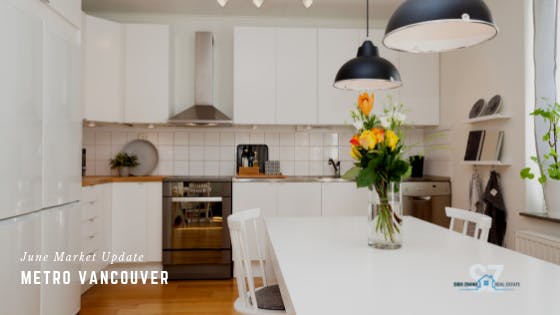
Overall Prices Remain Stable – Supply Has Increased, Big Sales Jump in May
The first thing I want to point out this month is that there was very little change in the overall residential market price average in Metro Vancouver. At the end of May, the composite benchmark price for all residential homes in Metro Vancouver was $1,006,400, a slight increase of 0.4 per cent from April. In the same period, the total inventory of listed homes rose to 14,685, an increase of 2.3 per cent from one month earlier. In fact, the increase in the number of listings in the past month was 2.1 per cent higher than in the previous month. For prospective home buyers this signals an excellent time to make an offer on the home you have been waiting for. You have a big choice of properties, and the statistics tell us that prices overall are still reasonably stable. It also appears like others are beginning to recognize this is a good time to buy. The number of actual sales in Metro Vancouver in May was a 44.2 per cent increase of homes sold in April. So, I would encourage you to make a purchasing decision now if you have been sitting on the fence, or seriously start looking if you haven’t taken advantage of the summer-like weather upon us now.
The Greater Vancouver region has some very nice properties listed now, and at much more attractive prices than you would have seen a year ago. All this of course is due to the price declines following the multiple taxes and mortgage constraints launched in 2018. The desired effect to cool a hot market and dampen rapidly escalating prices has been achieved. With the general benchmark price hovering around $1,000,000 – a psychological price threshold I have always watched closely – it may be prudent to ask if a price bottom has been reached. Think about this when you take a look at a property you are interested in. You can use the $1-million benchmark to compare what you think of a particular property listed in any specific area of the city. Below you have the benchmark comparisons in my monthly selections for you.
Detached Homes
The benchmark price for a single-family detached home in Greater Vancouver at the end of May was $1,006,400, a decrease of 0.4 per cent from the preceding month. The extremities of this average were Vancouver West (not West Vancouver) at $2,927,600 and Sunshine Coast at $600,300. (Note I include the Sunshine Coast only as a factor in the average, but do not report on housing prices in this area because it is to far away for my clients). The three municipalities closest to the benchmark on the higher side of the average were: Richmond at $1,503,700 a decrease of 1.8 per cent from the preceding month; Burnaby South at $1,508,100, a decrease of 1.5 per cent from the preceding month; and North Vancouver at $1,508,300, a decrease of 0.2 per cent from the preceding month. The three municipalities closest to benchmark on the lower side of the average were: Burnaby North at $1,407,600, an increase of 1.1 per cent from the preceding month; Port Moody at $1,405,700, an increase of 2.9 per cent from the preceding month; and Vancouver East at $1,347,000, a decrease of 0.7 per cent from the preceding month.
Townhouses
The benchmark price for a townhouse in Greater Vancouver at the end of May was $779,400, an increase of 0.6 per cent from the preceding month. The extremities of this average were Vancouver West (not West Vancouver) at $1,022,700 and Maple Ridge at $545,200. The three municipalities closest to the benchmark on the higher side of the average were: Burnaby South at $781,500, an increase of 1.7 per cent from the preceding month; Vancouver East at $873,700, an increase of 0.6 per cent from the preceding month; and North Vancouver at $953,200, an increase of 0.7 per cent from the preceding month;. The three municipalities closest to the benchmark on the lower side of the average were: Richmond at $776,700, an increase of 0.2 per cent from the preceding month; Burnaby North at $730,300, an increase of 3.0 per cent from the preceding month; and New Westminster at $715, a decrease of 2.3 per cent from the preceding month.
Condominiums
The benchmark price for a condominium in Greater Vancouver at the end of May was $664,200, a decrease of 0.5 per cent from the preceding month. The extremities of the average were West Vancouver at $1,022,700 and Maple Ridge at $350,700. The three municipalities closest to the benchmark on the higher side of the average were: Burnaby South at $676,400, a decrease of 0.4 per cent from the preceding month; Burnaby East at $748,100, a decrease of 0.9 per cent from the preceding month; and Vancouver West (not West Vancouver) at $785,500, a decrease of 0.8 per cent from the preceding month. The three municipalities closest to the benchmark on the lower side of the average were: Richmond at $637,900, a decrease of 0.2 per cent from the preceding month; Por Moody at $630,600, a decrease of 0.4 per cent from the preceding month; and Burnaby North at $615,100, an increase of 0.5 per cent from the preceding month.
Please ask how I can help
As I remind you in the space each month, I do enjoy seeing my clients achieve their goals in the housing market. For those of you who are thinking about renovating for your personal pleasure, or in preparation of listing your property for sale, it’s always important to maximize the value of your home. I have excellent contacts among reliable and honest tradespeople who can provide excellent workmanship for any renovation project. Let me know if I can help you in this way. I can also provide you with a comparative market evaluation of your home so you can determine the budget for your renovation most effectively.
Thanks for reading!
Sibo Zhang, REALTOR®
Please contact me for more information
604-779-7992
sibo.zhang@gmail.com
.

Buyers’ Market Continues: Total Inventory Rises
Following the post-Christmas effect that I described last month with its phenomenal spike in listings in January, February’s overall inventory closed with 7.2 per cent more listings than the previous month in Greater Vancouver, and 6.9 per cent more in the Fraser Valley. This means both areas continue to have a strong base of listings to maintain the current buyers’ market – good news especially for home hunters getting over the winter doldrums. Monthly price fluctuations levelled somewhat in February which was expected. There were some quite large price reductions in January which weren’t expected to continue, but the residual effect means that buyers can make some good deals at this time. You can check the monthly changes in the benchmark comparisons I make below. Where there are any month-over-months increases, they are quite small and reflect normal market activity. On the whole, the sliding monthly price declines are encouraging more listings, so buyers should take advantage of this. The higher inventories mean you will be able to make a good offer and not face severe competition in a bidding war.
COMBINED BENCHMARKS
The combined benchmark for all property types in Greater Vancouver at the end of February 2019 was $1,016,600, a decrease of 6.1 per cent from one year earlier, and a 0.3 per cent decrease from the preceding month. In the Fraser Valley the combined benchmark for all property types at the end of January 2019 was $822,100 a decrease of 2.8 per cent from one year earlier and a 0.1 per cent increase from the previous month.
METRO VANCOUVER
Total inventory hits 11,590 in February; 7.2 % increase over January
New listings across all property types reached 3.892 in February, not quite as high as January’s listings of 4,848, but still strong for the month to keep up a substantial inventory considering February’s sales were almost 35 per cent higher than in January.
Detached Homes
The benchmark price for a single-family detached home in Greater Vancouver at the end of February was $1,443,100, a decrease of 0.7 per cent from the preceding month. The extremities of this average were Vancouver West (not West Vancouver) at $3.029,200 and the Sunshine Coast at $603,700. (Note I include the Sunshine Coast region only as a factor in the average, but I do not report on housing prices in this area because it is to far away for my clients). The three municipalities closest to the benchmark on the higher side of the average were: North Vancouver at $1,492,400, a decrease of 1.3 per cent from the preceding month; South Burnaby at $1,542,100, a decrease of 0.5 per cent from the preceding month; and Richmond at $1,546,500, a decrease of 2.2 per cent from the preceding month. The three municipalities closest to the benchmark on the lower side of the average were: Vancouver East at $1,412,900, a decrease of 1.1 per cent from the preceding month; Port Moody at $1,404,100, a decrease of 3.5 per cent from the preceding month; and North Burnaby at $1,400,800, a decrease of 1.0 per cent from the preceding month.
Townhouses
The benchmark price for a townhouse in Greater Vancouver at the end of February was $789,300, a decrease of 1.4 per cent from the preceding month. The extremities of this average were Vancouver West (not West Vancouver) at $1,208,500 and Maple Ridge at $525,200. The three municipalities closest to the benchmark on the higher side of the average were: Richmond at $798,400, a decrease of 1.5 per cent from the preceding month; South Burnaby at $807,300, an increase of 1.8 per cent from the preceding month; and Vancouver East at $823,800, a decrease of 2.9 per cent from the preceding month. The three municipalities closest to the benchmark on the lower side of the average were: Ladner at $727,300, a decrease of 1.8 per cent from the preceding month; North Burnaby at $715,300, a decrease of 1.2 per cent from the preceding month; and Tsawwassen at $703,200, a decrease of 4.0 per cent from the preceding month.
Condominiums
The benchmark price for a condominium in Greater Vancouver at the end of February was $660,300, a decrease of 0.3 per cent from the preceding month. The extremities of this average were West Vancouver at $1,103,800 and Maple Ridge at $353,800. The three municipalities closest to the benchmark on the higher side of the average were: South Burnaby at $689,400, a decrease of 0.2 per cent from the preceding month; East Burnaby at $718,900, a decrease of 3.4 per cent from the preceding month; and Vancouver West (not West Vancouver) at $784,300, an increase of 0.1 per cent from the preceding month. The three municipalities closest to the benchmark on the lower side of the average were: Richmond at $660,100, an increase of 0.4 per cent from the preceding month; Port Moody at $622,500, a decrease of 1.1 per cent from the preceding month; and North Burnaby at $599,900, a decrease of 1.1 per cent from the preceding month.
FRASER VALLEY
Total February Inventory Reaches 6,406; 6.9 per cent Over January
Even with the 25 per cent increase in overall Valley sales over January, February’s inventory closed strongly with 2,216 new listings. The turnover of inventory continues to be relatively fast in this region, with single family detached homes on the market for an average of 43 days; townhouses averaging 39 days, and condominiums 40 days. The total number sales for al property types In February was 982. This represented 354 detached homes, 236 townhouses, and 288 condominiums. The Valley market continues as a sold buyers’ market at this time. Month-over-month increases in benchmarks for detached homes and condominiums very slight, 0.5 per cent and 0.2 per cent respectively; while the townhouse benchmark dropped 1.2 per cent for the month.
Detached Homes
The benchmark price for a single-family detached home in the Fraser Valley at the end of February was $958,900, an increase of 0.5 per cent from the preceding month. The extremities of this average were South Surrey/White Rock at $1,382,800 and Mission at $652,100. The three municipalities closest to the benchmark on the higher side of the average were: Langley at $983,900, an increase of 0.4 per cent from the preceding month; Cloverdale at $995,300, an increase of 1.7 per cent from the preceding month; and Surrey at $1,003,000, an increase of 0.5 per cent from the preceding month. The three municipalities closest to the benchmark on the lower side of the average were: North Surrey at $952,300, a decrease of 0.4 per cent from the preceding month; North Delta at $882,400, an increase of 0.3 per cent from the preceding month; and Abbotsford at $782,000, an increase of 0.5 per cent from the preceding month.
Townhouses
The benchmark price for a townhouse in the Fraser Valley at the end of February was $516,000, a decrease of 1.2 per cent from the preceding month. The extremities of this average were South Surrey/White Rock at $646,400 and Mission at $447,200. The three municipalities closest to the benchmark on the higher side of the average were: Cloverdale at $547,700, an increase of 2.9 per cent from the preceding month; Surrey at $551,200, a decrease of 3.3 per cent from the preceding month; and North Surrey at $565,000, a decrease of 0.7 per cent from the preceding month. The three municipalities on the lower side of the benchmark were: Langley at $486,100, an increase of 0.2 per cent from the preceding month; Mission at $447,200, a decrease of 1.0 per cent from the preceding month; and Abbotsford at $378,000, an increase of 0.2 per cent from the preceding month.
Condominiums
The benchmark price for a condominium in the Fraser Valley at the end of February was $409,700, an increase of 0.2 per cent from the preceding month. The extremities of this average were South Surrey/White Rock at $488,800 and Abbotsford at $303,100. The three municipalities closest to the benchmark on the higher side of the average were: Langley at $415,200, an increase of 1.6 per cent from the preceding month; Cloverdale at $456,700, an increase of 0.5 per cent from the preceding month; and South Surrey/White Rock at $488,800, an increase of 1.6 per cent from the preceding month. The three municipalities closest to the benchmark on the lower side of the average were: Surrey at $408,400, a decrease of 2.3 per cent from the preceding month; North Surrey at $403,300, an increase of 0.6 per cent from the preceding month; and North Delta at $376,700, a decrease of 3.7 per cent from the preceding month.
I can help
Please let me know if you need specific information for a market comparison in any property type. I am happy to prepare a customized market analysis for your home if you may be thinking of selling. And don’t forget, if you preparing you home for a listing, or just making renovations to enjoy yourself, I can recommend excellent and trustworthy trades people for whatever your needs, whether plumbing, electrical work, carpentry, or general renovations. I am also able to advise you on what your optimal investment should be to maximize your home’s value in the event you are planning to sell. And for prospective buyers, I have the financial experience to advise you on mortgages and fees associated with a home purchase. I am always happy to help in any way I can.
Thanks for reading!
Sibo Zhang, REALTOR®
